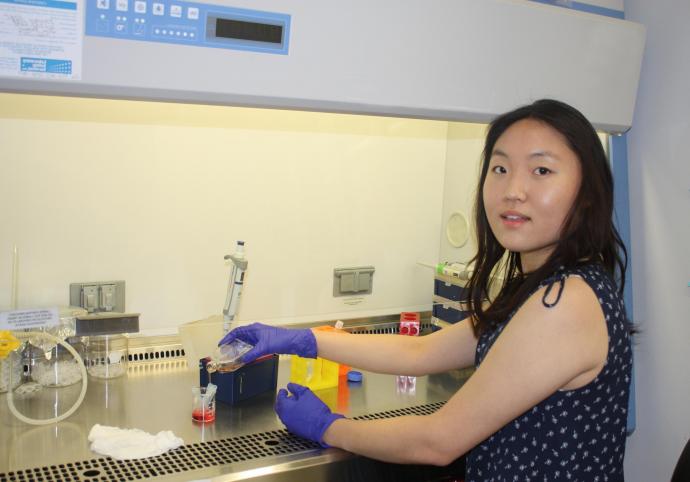Senior Success: Amid Pandemic, Soojin Kim Declares She's All In for Emergency Medicine

Footage of emergency room workers managing overflow crowds of gravely sick patients with deftness, humanity and visible emotion has been nightly, gut-wrenching viewing for millions of Americans over the course of the COVID-19 pandemic. For senior Soojin Kim, those often-harrowing scenes prompted one thought: “I’m in.”
“I wish I could have been a first-year resident going into one of those hospitals. To be able to help out so much, I gladly would have done it,” said Kim, a biomedical engineering major who heads to Rowan University’s Cooper Medical School this fall, where she plans to specialize in trauma or urgent care.
Indeed, the competence-under-fire of those workers, including her mother, a nurse who brought homes accounts of nonstop alarm bells going off some nights, just cemented her decision.
“I feel I belong in this setting. I’m not a desk person – I need a fast-paced environment,” Kim notes. “I also feel there is so much to learn there. The emergency room proceeds case by case. You see such a variety there – of everything and everyone. Each case has to be addressed differently.”
“And I’m bilingual,” she adds. “I was born in South Korea and speak Korean, so that will be helpful in a setting where things have to happen quickly. I won’t need to call in a translator with those patients.”
Kim says that her major “kept me on my toes,” preparing her for the challenges to come in medical school. Working in research laboratories, she notes, taught her to develop new skills quickly and to build on them to perform new, more complex tasks with confidence. Her work freshman year on endothelial cell cultures with Alice Lee, director of NJIT’s Cardiovascular Tissue Engineering and Stem Cell Laboratory (below) set her up, for example, to take on sophisticated techniques such as fluorescent microscopy to observe live cell behaviors.
Under Vivek Kumar, director of the Biomaterial Drug Development, Discovery and Delivery Laboratory, she worked on a hydrogel therapy to block formation of aberrant blood vessels in the eyes of diabetes patients. And that research led to one of the highlights of her college career – co-authorship of a scholarly article published in the American Chemistry Society’s peer-reviewed journal, Applied Bio-Materials.
Kim got swept up in biomedical engineering on her first visit to campus, when a student ambassador urged her to tour some labs.
“The department is so active and there’s so much enthusiasm. I met a couple of professors and saw how willing they were to help students, how open they were to undergraduate researchers,” she recounts, noting of engineering in general, “A lot of disciplines are about learning things. Engineering is about trying out ideas and applying them.”
But the real clincher for medical school was winning a spot in a six-week-long “clinical observorship” program at Saint Barnabas Medical Center, open each year to three biomedical engineering students, where she shadowed various surgical residents. The experience was riveting, Kim recalled, pointing to cases such as the patient with an arm so severely burned that amputation was a distinct possibility. Instead, he underwent reconstructive surgery that involved transplanting back muscles to his forearm, as well as skin grafts.
“I think my main takeaway – the thing that impressed me most – was how the doctors and nurses always respected the wishes of the patients. They never imposed their opinion, but worked with the patient to deliver the highest quality of life achievable and help them normalize back to their lives.”
But Kim, a top student with a 3.99 GPA, did not spend her entire four years at NJIT in labs or internships. Her broad participation in campus life – student ambassador for Albert Dorman Honors College, member of the student senate and a longtime math tutor for fellow students, among other activities – led to her selection as the Madame Mau Outstanding Female Engineering Student for the class of 2020.
Always moving – literally – she and her roommate also founded the campus Mixed Martial Arts Club their freshman year to offer students an unusual experience – the opportunity to try on a variety of martial arts, including karate, taekwondo, boxing and wrestling. “Most people only knew one style, so they got to learn two or three others. I’d never wrestled, for example,” she explains.
There was also weapons training, which led to another peak experience: a light saber gathering in a darkened ballroom that featured 100 people wielding glow-in-the-dark plastic swords – and pizza.
Kim heads to medical school this fall on a characteristically upbeat note: She believes the pandemic has left the medical profession in a better position. The chaos of the early days – and the ability to learn on the job and forge order out of it – will leave future generations better prepared.
“Hospitals will be more systematized as a result. If there’s a next time, we know how things can be,” she says. “I also think it gave all of us – from health care workers to patients – better awareness about health and medicine. I hope we’ll be better protected next time.”
